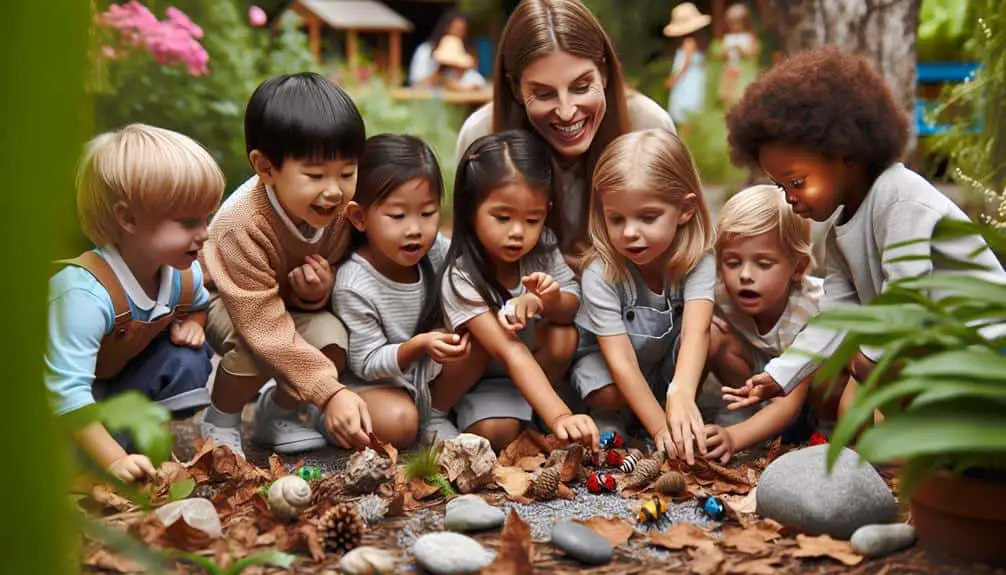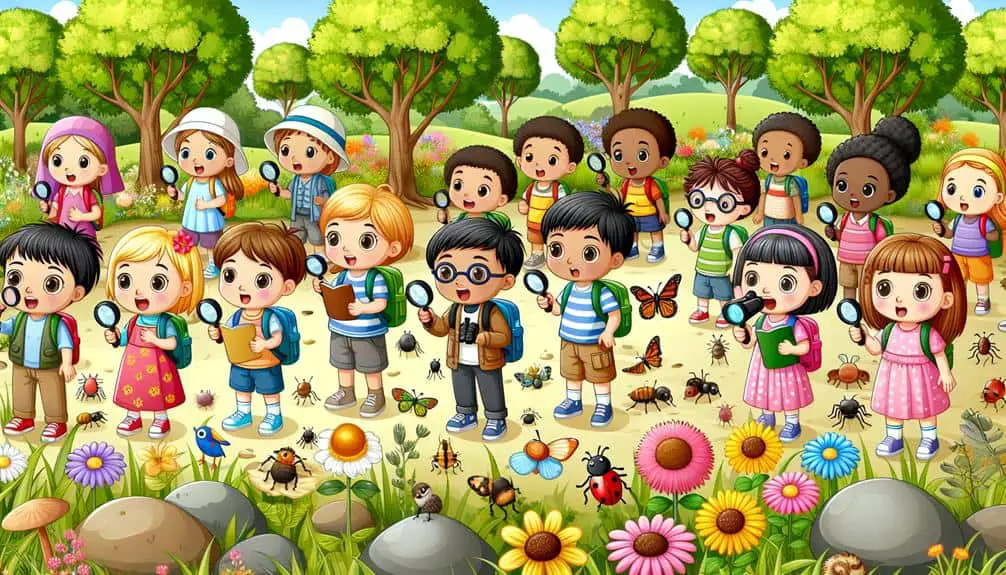Incorporating nature studies in preschool homeschooling helps your child develop a profound love for the environment and nurtures a well-rounded education. By exploring the outdoors, they enhance their senses, spark curiosity, and refine motor skills. Engaging in nature activities like scavenger hunts and gardening not only educates but also instills responsibility and creativity. Integrating science with nature through experiments and journaling creates a fun and enriching learning experience. Delve deeper into the benefits of nature studies for your preschool homeschooling to reveal a world of educational opportunities waiting for your little one.
Key Points
- Fosters appreciation for the environment and instills a lifelong love for nature.
- Enhances sensory development and fine motor skills through outdoor exploration.
- Encourages curiosity, creativity, and observation skills essential for early childhood development.
- Integrates science and nature, providing engaging, hands-on learning experiences.
- Nature studies offer holistic education, blending art, science, and sensory experiences.
Benefits of Nature Studies
Exploring nature in preschool homeschooling not only fosters a deep appreciation for the environment but also enhances sensory development and encourages curiosity about the world around us.
Engaging with the natural world at a young age can have profound benefits for your child's cognitive and physical development. Through hands-on experiences like feeling different textures, smelling flowers, and observing animals, children can improve their sensory development. This sensory exploration helps children learn about their surroundings, develop fine motor skills, and enhance their ability to process information.
Moreover, by spending time outdoors, children develop a sense of environmental awareness. They learn to respect and care for nature, understanding the importance of conservation and sustainability. This early exposure to the natural world can instill a lifelong love for the environment and a desire to protect it.
Encouraging environmental awareness from a young age can lead to more responsible and eco-conscious individuals in the future. So, embrace nature in your preschool homeschooling curriculum and watch your child flourish with heightened sensory development and a deep respect for the world around them.
Outdoor Learning Activities
Enhance your child's learning experience by incorporating engaging outdoor activities into your preschool homeschooling curriculum. Nature scavenger hunts are an excellent way to encourage exploration and observation skills in your little one. Create a list of items for them to find in your backyard or local park, such as a smooth rock, a yellow leaf, or a prickly pinecone. These hunts not only teach children about the natural world but also foster a sense of curiosity and wonder.
Sensory experiences are also vital for early childhood development. Take your child outside to feel the different textures of leaves, smell the fresh air after it rains, and listen to the sounds of birds chirping. These simple activities can help children build connections with nature and develop their sensory awareness.
Gardening projects provide hands-on learning opportunities for preschoolers. Planting seeds, watering plants, and watching them grow can teach children about responsibility, patience, and the cycle of life.
Additionally, engaging in nature art activities like leaf rubbings, rock painting, or creating nature collages can spark creativity and imagination in your child. Outdoor learning activities offer a holistic approach to education, combining fun, exploration, and valuable life lessons.
Nature Exploration Ideas
Get ready to expand your child's nature experiences with creative and hands-on exploration ideas that will spark their curiosity and deepen their connection to the natural world.
Nature scavenger hunts are a fantastic way to engage your preschooler in the environment around them. Create a list of items like pinecones, different colored leaves, or smooth stones, and head out to the backyard or a nearby park to hunt for these treasures together.
Outdoor art projects provide another avenue for exploring nature. Gather materials such as paints, brushes, and paper, and encourage your child to paint what they see outside. Whether it's a blooming flower, a fluttering butterfly, or the shape of a tree, this activity will foster creativity and observation skills.
Additionally, consider making nature journals where your child can draw or write about their outdoor adventures. These journals can serve as a wonderful keepsake and a way to track the changes in nature over time.
Embrace these nature exploration ideas to make learning both fun and meaningful for your preschooler.
Integrating Science and Nature
Immerse your preschooler in the wonders of science and nature through hands-on activities and exploration. Encourage curiosity by engaging in hands-on experiments that allow your child to observe and interact with natural phenomena. Whether it's planting seeds and watching them grow, experimenting with water and ice, or exploring the properties of different rocks, these activities foster a love for learning and a deeper understanding of the world around us.
Nature journaling is another fantastic way to integrate science and nature into your homeschooling curriculum. Encourage your child to document their observations, sketches, and thoughts about the natural world. Not only does this activity improve their writing and observational skills, but it also helps them develop a deeper connection with nature.
Sensory experiences play an important role in science and nature exploration. Encourage your preschooler to touch, smell, listen, and observe their surroundings. Engage all their senses to create a holistic understanding of the environment.
Lastly, wildlife observation is an exciting way to blend science and nature. Take nature walks, visit local parks, and observe animals in their natural habitats. Encourage your child to ask questions, make predictions, and learn about the diverse wildlife that surrounds them. By integrating science and nature in your preschool homeschooling, you provide your child with a rich and engaging learning experience.
Resources for Nature Curriculum
Explore a variety of resources that can enrich your preschooler's nature curriculum and enhance their learning experience. Nature journaling is a fantastic way for your child to document their observations and reflections on the natural world. Encourage them to sketch plants, animals, or landscapes they encounter during your outdoor adventures.
Field trips to local parks, nature reserves, or botanical gardens provide hands-on learning experiences that can deepen your child's understanding of nature.
Integrate nature crafts into your curriculum to foster creativity and tactile learning. Activities like leaf rubbings, rock painting, or bird feeder making can engage your preschooler while connecting them to the environment.
Scavenger hunts are another exciting way to make learning about nature interactive and fun. Create scavenger hunt lists with items like pinecones, different types of leaves, or animal tracks to encourage exploration and observation skills.
Frequently Asked Questions
How Can Nature Studies Benefit Children's Mental Health and Well-Being?
Exploring outdoors and engaging in nature studies can greatly benefit your mental health and well-being. Through mindfulness practices, nature journaling, and sensory activities, you can develop a deeper connection with the natural world, fostering inner peace and happiness.
What Are Some Tips for Incorporating Nature Studies Into a Small Indoor Space?
To bring nature studies into a small indoor space, get creative with activities like making terrariums or bird feeders. Encourage sensory exploration through plant care and nature journaling. These hands-on experiences can foster a love for nature.
Are There Specific Nature Study Resources Available for Children With Disabilities?
Did you know that 7 in 10 children with disabilities have limited access to inclusive nature resources? You can empower them through adapted activities, sensory experiences, and outdoor exploration. Seek out specialized resources to enhance their learning journey.
Can Nature Studies Be Integrated With Other Subjects Like Math or Art?
Integrating nature studies with math and art boosts creativity and critical thinking. Explore nature-inspired math activities like counting leaves or measuring shadows. Get crafty with art projects using natural materials like creating leaf rubbings or rock painting.
How Can Parents Track and Assess Their Child's Progress in Nature Studies?
To track and assess progress in nature studies, involve yourself actively. Keep a nature journal, take photos, make observations together. Discuss discoveries, ask questions, and encourage curiosity. Celebrate achievements, no matter how small.



